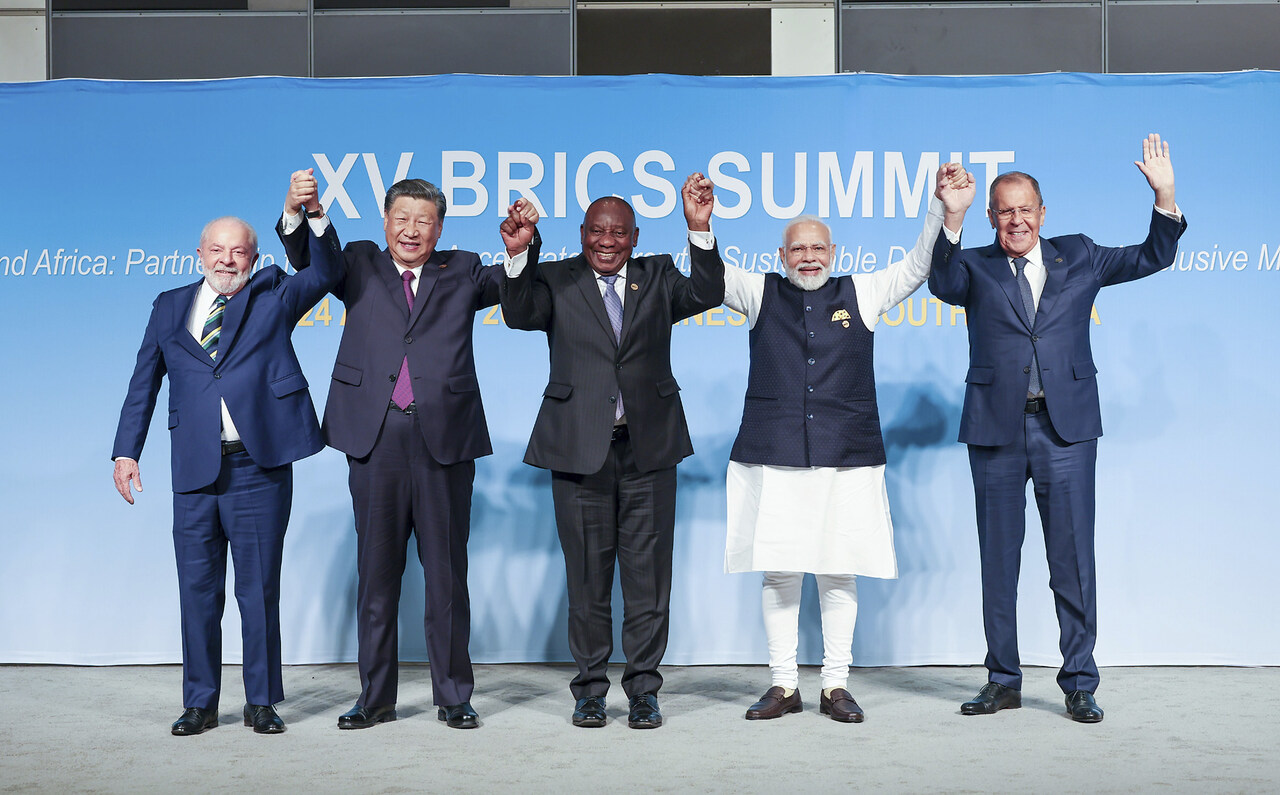South Africa BRICS Summit Amplifies the Voice of the Global South
The meeting of BRICS group leaders in Johannesburg on 22-24 August resulted in the decision to expand the forum by six new members. BRICS thus becomes the strongest voice of the Global South, which will increase the pressure to reform the international system towards limiting the role of the West and increasing the influence of developing countries.
 Prime Ministers Office/Press Inf/Zuma Press/Forum
Prime Ministers Office/Press Inf/Zuma Press/Forum
Under what circumstances did the summit take place?
BRICS is an informal cooperation platform established in 2009 between five emerging economies—Brazil, Russia, India, China, and South Africa. Together they account for over 40% of the world's population, 26% of global GDP, and 18% of trade. The summit in South Africa was the 15th meeting of the group’s leaders, but the first in person since 2019 and the outbreak of the COVID-19 pandemic, which was followed by the deterioration of relations between China and India in June 2020, and the Russian aggression against Ukraine in 2022. Russian President Vladimir Putin did not attend the meeting (Foreign Minister Sergei Lavrov represented Russia), likely because of the potential for his arrest on the basis of a warrant issued by the International Criminal Court for crimes in Ukraine. The summit also took place during the economic slowdown in China, the deterioration of relations between Russia and China with the West, and preparations for the G20 summit in September in India. It was the largest so far in terms of the number of participants, with the additional BRICS-Africa Outreach and BRICS Plus Dialogue meetings attended by representatives of nearly 70 countries, mostly African. The motto of the summit organised during the South African presidency of the group was “BRICS and Africa”, which demonstrates that the format aims to consolidate engagement with this continent. Prior to the summit, 23 countries had formally applied for membership and more than 40 had expressed an interest in joining the BRICS.
What are the main results?
The key topics of discussion included de-dollarisation of transactions in the global financial and trading system and expansion of the BRICS membership. The most important achievement of the summit was an agreement on guiding principles, standards, conditions, and the procedure for BRICS enlargement. It was agreed that in the first phase, the group will be joined by six countries that will become full members from January 2024—Argentina, Saudi Arabia, Egypt, Ethiopia, Iran, and the UAE. The BRICS countries want to build a more “inclusive and fair” international system. Less progress was made on setting rules for the use of national currencies in settlements between members, with this task being delegated to finance ministers in preparation for the next summit in 2024. In a joint declaration, leaders expressed “concern” about the imposition of unilateral restrictive measures that “have a negative impact on developing countries”, which is a clear critique of the Western sanctions on Russia and China. The members called for increased participation of BRICS states in international institutions and organisations, including reform of the UN Security Council, an increase in voting shares (quotas) in the IMF, and access to the position of president of the World Bank.
What is the significance of the summit for BRICS members?
The results of the meeting are particularly favourable to China, which has pushed for the expansion of the group as a way to increase its influence and promote its own projects (Belt and Road Initiative, Global Security Initiative, Global Development Initiative) in developing countries. Chinese President Xi Jinping also paid an official visit to South Africa and took part in the China-Africa Leaders Dialogue on the sidelines of the BRICS summit, strengthening China’s position on the continent. The main benefit for Russia was showing that it was not internationally isolated, although its image was affected by Putin’s absence. The Russian leader, however, used his online speech to repeat accusations that the West had sparked the war in Ukraine and the resulting food crisis. The final document did not explicitly mention the situation in Ukraine, but the BRICS leaders in their speeches called for a “ceasefire” as soon as possible, mentioning their own peace initiatives. Russia is to host the next summit in 2024. India, in turn, has been assured of the support of the other members for its presidency of the G20, which increases the chances of success of the summit in Delhi on 9-10 September (e.g., the admission of the African Union to the G20). South Africa could present itself as an effective organiser of the historic event and a representative of Africa that seeks the interests of the entire continent. India, Brazil, and South Africa also received support from the BRICS states for their aspirations for a permanent seat on the UN Security Council.
What will the future of the BRICS look like?
The announcement of the “first phase” of the BRICS expansion implies that the format remains open to more countries. The leaders also announced preparations for the next summit with a new model of “partner countries”, which means the possibility of a looser form of membership. In the coming months, it is expected that the rules of operation of the extended group will be clarified, including the method of decision-making, organisation of summits, and even the name. BRICS institutions will also become more open to accepting new members, for example, The New Development Bank and the Contingent Reserve Arrangement. It also means subsidising these institutions and extending aid activities to new countries. On the one hand, increasing the BRICS membership strengthens its economic and political potential and, as a result, its international impact. The group’s population will increase by 412 million people and GDP by $3.2 trillion, which means that its share of the global economy increases to 29%. Major oil exporters and key countries in the Middle East are now members of the organisation. On the other hand, doubling the number of members, including the admission of countries with troubled relations (such as Iran and Saudi Arabia) will further increase the diversity of the group, making it more difficult to develop a common position and win compromises, and as a result, it may see a decrease in effectiveness. Nevertheless, the enlarged BRICS will become the main collective representative of the interests of the Global South.
What do the results of the summit mean for the West?
The enlargement of BRICS reinforces a shift in the division of the world between the traditional West (Europe-U.S.) and East (Russia-China) to the wealthy North and the emerging Global South. This will limit the West’s ability to influence BRICS members and promote its own interests in international trade or climate negotiations. BRICS opposes, for example, the U.S. proposal of the withdrawal of some developing countries’ trade privileges (SDT) under the WTO, as well as the introduction of new trade restrictions under the “pretext” of combating climate change (e.g., the EU border tax). We should expect growing pressure from the BRICS on developed countries to fulfil their obligations to transfer 0.7% of their GDP to development aid, or to finance, technology and knowledge transfers necessary to combat climate change. However, the development of the BRICS does not mean the creation of a new anti-Western alliance, as many members (e.g., India, Brazil, Saudi Arabia) want to maintain good relations with the West. In addition, due to tensions between members and fears of China’s dominance in the group, the other BRICS members do not want to just replace an international order led by the U.S. for one dominated by China. The strengthening of BRICS, on the other hand, increases the pressure to reform the main international organisations and change the existing system towards a multipolar order, with the result being weakening of the West. The ambitious idea of creating a common BRICS currency is unlikely, but a switch to national currencies in settlements between the growing number of members is expected, which may gradually weaken the position of the dollar in the international financial system.


